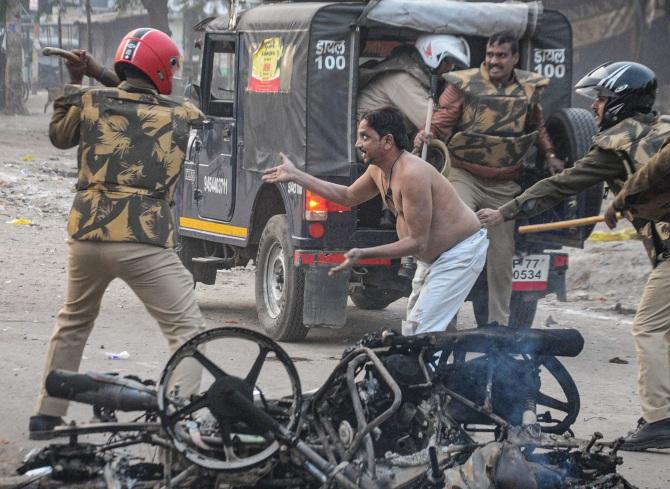The Indian police is governed by the archaic, colonial-era Police Act of 1861, which has no place in a democracy.
It was created to make the police subservient to its masters and, consequently, antagonistic to the masses, states Veenu Sandhu.

One year ended with a question mark hanging over the police.
And the next too began with a question mark hanging over the police.
The first one in Uttar Pradesh, where the police are alleged to have targeted and vandalised homes based on the faith of the occupants.
The second in Delhi, where the police allegedly looked away as masked men and women ran amok attacking students of a university with iron rods.
In the national capital, the chief minister said: 'I don't blame Delhi Police... They get orders from above.'
Arvind Kejriwal -- like chief ministers before him -- has been demanding that the Delhi government be given executive control over the Delhi police.
Unlike in other states, where the police report to the respective state governments, Article 239AA(3)(a) of the Constitution bars the Delhi government from passing laws on police and public order, both of which fall under the Union home ministry.
This is primarily because Delhi is also the power centre of the country from where Parliament functions.
It houses various embassies and high commissions, and has foreign dignitaries visiting practically through the year.
So its security requirements are unique.
In an ideal scenario, the city-state would be demarcated into two territories -- one, where police control of nationally and internationally sensitive areas of Delhi is placed under the home ministry and the other, under the state government.
But for such a judicial demarcation to happen, nothing less than a Constitutional amendment would be required.
The problem, however, runs far deeper.
It stems from the very idea of the government -- and thereby political masters -- controlling the police.
The Indian police is governed by the archaic, colonial-era Police Act of 1861, which has no place in a democracy.
This Act came into force as a direct fallout of what we call the First War of Independence and which the British called the Sepoy Mutiny of 1857.
It was created to make the police subservient to its masters and, consequently, antagonistic to the masses.
More than 150 years later, the police continue to be a tool in the hands of political masters.
Time and again, voices from within the police force have called out for reforms.
Ved Marwah, who served as the Delhi police commissioner and was joint secretary, National Police Commission on police reforms, wrote in Seminar in 2009: 'The new democratically elected rulers are not very different from the colonial masters. In fact, the situation is much worse. They not only use and misuse the police for party purposes, they manipulate it for all sorts of usavoury ends.'
In the context of insurgency-affected states, he went to the extent of calling the police the 'armed wing of the ruling party'.
I spoke with Prakash Singh, who served as director general of police of the Border Security Force, Assam and Uttar Pradesh.
It was on his petition (Prakash Singh versus Union of India) that on September 22, 2006, the Supreme Court of India delivered a historic judgment that could have had far-reaching consequences on police reform -- had the state and central governments complied with it honestly.
The country's top court directed the state and central governments to comply with a set of directives at the heart of which lay two key objectives: Functional autonomy for and accountability of the police.
One of the directives was to set up a 'State Security Commission' in every state.
This would be a sort of check-post between the police and the government, a watchdog that would insulate the police from unwarranted external influences and pressures, and ensure that the force acted according to the law of the land.
The commission would broadly include, besides government representatives like the chief minister, home minister, the Lok Ayukta, a retired high court judge (nominated by the Chief Justice), members of state human rights commission, chief secretary, leader of opposition, the DGP and some independent members.
Dismissing all objections, the apex court directed the governments, which expectedly dilly-dallied, to file affidavits of compliance.
Despite the court's order, the states either did not constitute these commissions or constituted farcical commissions, Singh told me.
Some state governments dishonestly packed the commission with people who were favourably disposed towards them.
And so an urgently needed reform became a farce.
Singh's lament was that despite its powerful directives, the top court has not issued a single contempt notice to any state government and thus, its role in pursuing the implementation of its own directions has been weak.
And that is such a pity.
Recent events have shown us that a correction is in order, urgently.











